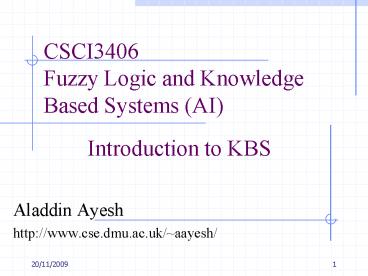CSCI3406 Fuzzy Logic and Knowledge Based Systems AI - PowerPoint PPT Presentation
1 / 15
Title:
CSCI3406 Fuzzy Logic and Knowledge Based Systems AI
Description:
Topics of Discussion. AI. Simple AI systems. Developing KBS. Some famous ... therefore, relates strongly to fields such as psychology, biology and sociology. ... – PowerPoint PPT presentation
Number of Views:206
Avg rating:3.0/5.0
Title: CSCI3406 Fuzzy Logic and Knowledge Based Systems AI
1
CSCI3406 Fuzzy Logic and Knowledge Based Systems
(AI)
Introduction to KBS
- Aladdin Ayesh
- http//www.cse.dmu.ac.uk/aayesh/
2
Introduction
- In this lecture, we cover an introduction to KBS.
- We start with identifying the different types of
AI numerical and symbolic. - We look at some search algorithms as simple AI
system.
3
Topics of Discussion
- AI
- Simple AI systems
- Developing KBS
- Some famous KBS
4
AI
- Artificial Intelligence is the field of computing
that attempts at providing computational models
of some human activities, which researchers
consider intelligent activities, such as
learning, acting, decision making, evolving and
so on. AI, therefore, relates strongly to fields
such as psychology, biology and sociology. In
some cases new disciplines emerged such as
bio-informatics and cybernetics.
5
AI
- There are two main streams in developing AI
systems quantitive and qualitative approaches. - Quantitive approaches sometime referred to as
numerical approaches, because they use quantities
in analysing the problems. - Neural nets, fuzzy logic, genetic algorithms are
all examples of the quantitive approach.
6
AI
- Qualitative approaches sometimes referred to as
symbolic approaches, because they use qualities
of the problem to solve the problem. - Logic, rules, lists based systems are examples of
qualitative AI systems.
7
Simple AI systems
- The simplest view of AI systems is as a search
problem solver. It is almost impossible to
develop an expert system without implementing
some search technique or another to navigate
through the problem domain for the solution.
Search techniques provide the base for the
inference engine, which is an essential component
of any expert system.
8
Simple AI systems
- There are two main types of searches
Conventional searches and heuristic searches. - Conventional searches cover the entire domain and
eventually find the solution, what is the problem
with that? - Heuristic searches aim at reducing the domain or
covering a selected portion of the problem
domain. What is the problem with that?
9
Simple AI systems
- Conventional searches include
- Depth first search
- Breadth first search
- Heuristic searches include
- Generate and test.
- Hill climbing.
- Best first.
- Problem reduction.
- Constraint satisfaction.
- Means-end analysis.
10
Developing KBS
- (Please refer to the second lecture and lecture
notes part 2) - Many KBSs are symbolic systems.
- There are two distinctive parts need to be
included in any KBS - Knowledge representation, which is usually the
result of knowledge acquisition. - Inference Engine, which you would not usually
need to develop if you are using an expert system
shell such as CLIPS.
11
Developing KBS
- In KBS, we also call them exact systems, we do
not need to imply certainty factor as we did in
FLS. - In CLIPS, KBS can be developed as pure rules
without the need to define fuzzy sets, I.e. no
deftemplate is required.
12
Some famous KBS
- DENDRAL (Late 60s)
- MYCIN (Mid 1970s)
- PROSPECTOR (1980s)
- R1/XCON (1980s)
- Health Service (1980s)
13
Conclusion
- AI systems and search algorithms.
- Developing KBS.
14
References
- Lecture notes part 2.
15
Next Steps
- Next
- Knowledge acquisition.































